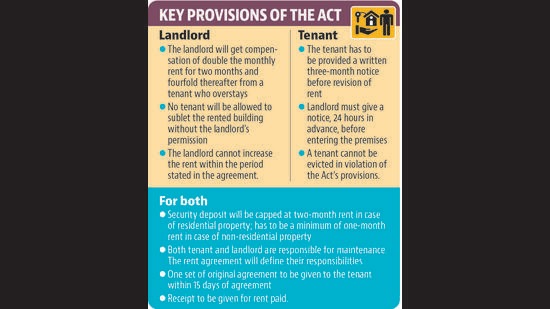Now, Chandigarh to place its Tenancy Act before Parliament for nod
The Chandigarh administration was previously considering to notify the draft, based on central Model Tenancy Act, 2021
Earlier expected to be notified based on the approved draft, the long-awaited Chandigarh Tenancy Act will now be in queue for enactment by the Parliament.

The UT administration has decided to send the proposed Act, based on Centre’s Model Tenancy Act, 2021, to the Union government for approval and enactment.
UT adviser Dharam Pal said, “For the proposal to become an Act, the Parliament has to pass it and thereafter, the Centre will notify it for implementation in Chandigarh.”
Central government’s Model Tenancy Act, 2021, was approved in June last year, following which the UT administration had decided to adopt it, and invited public comments after notifying a draft of the Act. It was recently approved by UT administrator Banwarilal Purohit.
“While initially the administration was planning to enforce the Act based on the approved draft, after legal advice, it has now decided to send the legislative proposal to the Parliament,” said a senior UT official.
Before the 2021 central law came in place, UT, in June 2019, had prepared a draft based on Centre’s Model Tenancy Act, 2015. But two months later, the government proposed a new Act in August 2019 and it was finally approved by the Union cabinet in June 2021. The Centre had asked the states and UTs to adopt the Model Act.
To replace 70-year-old rulebook
The proposed Act is aimed at replacing the existing tenancy provisions of the more than 70 years old East Punjab Urban Rent Restriction Act, 1949.
It is considered outdated, particularly in resolving the tenant-landlord disputes.
Notably, according to the 2011 Census, Chandigarh has the highest incidence of tenant population, with nearly half of the city’s population (47%) living in rented accommodations.
Tenant-landlord disputes are chronic in the city, especially where commercial properties are concerned.
This, many experts believe, has led to landlords avoiding renting out their properties, further causing paucity of rental spaces and pushing up rents.

Creation of rent authority
The key provision of the proposed Act is setting up of a rent authority, which will have exclusive jurisdiction over tenancy issues, including tenant-landlord disputes that are currently taken up in civil courts.
All rent agreements will have to be submitted to this authority. The landowner and the tenant will have to separately file the particulars within a month of signing the agreement. Currently, these can be registered at the sub-registrar’s office.
Shared responsibility
The Act proposes that both tenant and landlord, with clear definitions, share responsibility for the property’s maintenance.
Cutting off or withholding essential supplies or services is prohibited. In case the landlord does not accept rent, it is to be deposited with the rent authority.
A Rent Court will consist of two members, to be appointed by the UT administration in consultation with the Punjab and Haryana high court. A Rent Tribunal will also be constituted to hear appeals against the Rent Court decisions.





